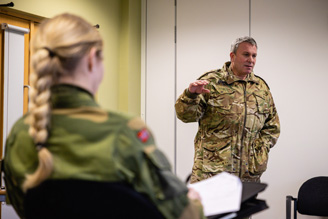On the 25th Jan 2023, NATO's Allied Rapid Reaction Corps (ARRC) hosted a NATO Medical table top exercise, on behalf of the Chair of the NATO Committee of Chiefs of Military Medical Services (COMEDS) and UK Surgeon General, Major General Tim Hodgetts, bringing together representatives from the Defence Medical Services of ten Nations and the UK.

The aim of the exercise was to explore the complexity of delivering Health Service Support in peacetime, crisis and conflict as well as scaling-up the support as and when required. Participants, in attendance, represented many of the key NATO organisations, along with national representatives and several different UK defence medical services. The broad audience allowed for a very detailed discussion on some of the key issues commonly faced in the delivery of medical support in an interoperable, integrated and interchangeable manner.

Some of the key themes developed throughout the day, included the need to ensure joint planning at the highest levels throughout NATO, a clear understanding of military and civilian medical capabilities and how these may be used in a time of crisis, potentially providing mutual support. Discussions also focused on the need to adapt current thinking on casualty management to ensure that at the political, societal and senior military level, there is an understanding of the nature of the care that would be provided at a time of significant casualty sustainment, and how it may differ from what has been seen during recent campaigns.
The agenda then turned to the importance of the logistical chain, in supporting the delivery of care and the challenges resulting from the differences in equipment, pharmaceuticals, policy, training and regulations. Participants also explored novel approaches to patient flow along the evacuation chain; the development of decision-making tools to support senior medical commanders; and the need to consider civilian healthcare systems, while undertaking training in the delivery of care, especially in light of severe injuries resulting from warfighting, which they may not encounter routinely.
The outcomes of the day's discussions will contribute to further innovation and experimentation through both, the NATO Force Structure and multiple working groups that feed into the COMEDS. This is hopefully a significant steppingstone to ensuring that NATO is able to provide the best possible health service support to those serving the Alliance, at home or abroad.






